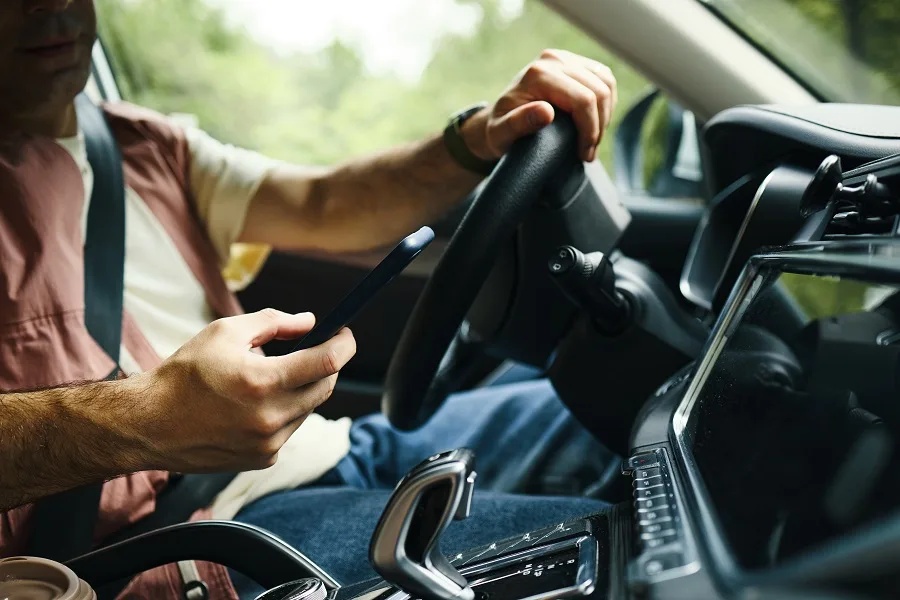NYC Rideshare Accidents: The Growing Risk on Our Streets
New York City's approximately 78,000 Uber and Lyft vehicles have transformed daily transportation, but convenience comes with serious risks. Rideshare accidents happen every day across all five boroughs, affecting passengers, drivers, pedestrians, and other motorists.
The complexities of rideshare insurance — determining which policy applies based on the driver's app status at the moment of collision — demand legal representation with proven experience. If you've been involved in a rideshare accident, whether as a passenger, a rideshare driver, or a third party, our Uber and Lyft accident lawyers know how to fight these claims and secure the compensation you deserve.
Common Scenarios of Rideshare Accidents We Can Help You With

Rideshare accidents take many forms on NYC streets, each presenting distinct legal and insurance challenges. Our attorneys have handled every type of Lyft and Uber accident, from straightforward two-car crashes to complex multi-vehicle incidents involving multiple insurance carriers.
- Collisions between rideshare and private vehicles: Rideshare vehicles frequently collide with private cars, motorcycles, and trucks throughout the five boroughs, creating disputes over fault and insurance coverage.
- Rideshare accidents involving pedestrians or cyclists: These accidents can be devastating in densely populated areas like Manhattan and Brooklyn, where rideshare vehicles navigate crowded streets with frequent stops for pickups and drop-offs.
- Single-vehicle Lyft or Uber accidents: Rideshare drivers involved in single-vehicle crashes due to poor road conditions, adverse weather, or driver error still face complex insurance coverage questions.
- Multi-vehicle pile-ups: When rideshare vehicles are involved in complex accidents with multiple vehicles, determining liability and navigating multiple insurance policies can be particularly challenging.
Compensation You May Be Entitled to After a Rideshare Accident Injury
Our attorneys fight to recover every dollar you're owed, whether your case involves a simple fender-bender or a catastrophic collision.
- Medical expenses: All treatment costs related to your injuries, from emergency room visits and surgeries to medications, physical therapy, and future medical care you'll need for lasting injuries.
- Lost wages and earning capacity: Compensation for income you've already lost while recovering, plus future earnings if your injuries prevent you from returning to your previous job or reduce your ability to earn.
- Pain and suffering: Damages for the physical pain and emotional distress you've endured, including long-term psychological impacts like anxiety, depression, or PTSD that often follow serious accidents.
- Property damage: Costs to repair or replace your vehicle and any other personal property damaged or destroyed in the collision.
- Punitive damages: In cases where the rideshare driver's behavior was particularly reckless, such as driving while intoxicated or with a suspended license, courts may award additional damages to punish the wrongdoer.
- Wrongful death damages: If a rideshare accident results in a fatality, surviving family members can seek compensation for funeral and burial expenses, loss of financial support the deceased would have provided, and loss of companionship.
- Rehabilitation costs: Physical and occupational therapy expenses, along with costs for adaptive devices or home modifications if your injuries result in permanent disability.
What Should I Do Immediately After a Rideshare Accident in NY?
Unlike regular car accidents, rideshare crashes involve app data that disappears, multiple insurance policies that shift by the second, and corporate legal teams mobilizing fast:
Getting Compensation: How Rideshare Insurance Coverage Works in NYC

The insurance policy that covers your rideshare accident depends entirely on what the driver was doing the moment the crash occurred. Uber and Lyft structure their coverage in three distinct periods, each triggering different insurance limits and creating different legal battles.
What Makes Rideshare Accident Claims Difficult
These complications separate rideshare claims from typical car accidents:
- Layered insurance coverage: Rideshare drivers carry personal auto insurance that typically excludes commercial use, plus the rideshare company's supplemental policies that activate based on app status. Determining which policy applies — and which company pays — often requires litigation.
- Comparative fault rules: New York follows pure comparative negligence, meaning you can recover damages even if you're partially at fault. However, your compensation is reduced by the percentage of fault you bear. Insurance companies exploit this by trying to shift blame onto victims.
- Three-year filing deadline: New York's statute of limitations gives you three years from the accident date to file a personal injury lawsuit. However, waiting anywhere close to that deadline risks losing vital evidence. Our car accident lawyers recommend consultation immediately after your accident to preserve all evidence while it's still available.
- Immediate evidence preservation: App data, GPS records, and trip details can disappear or become inaccessible within days. Insurance companies know this and delay investigations, hoping the evidence will vanish.
Don't Talk to Insurance Companies Without Legal Representation

Uber and Lyft's insurance adjusters will contact you within hours, often while you're still being treated for injuries. They'll ask for recorded statements designed to get you to minimize your injuries or accept partial blame. They'll offer quick settlements that seem substantial but cover only a fraction of your actual damages.
The insurance maze that follows rideshare accidents — with multiple carriers, coverage gaps, and sophisticated corporate defense teams — makes experienced legal representation necessary, not optional. Our attorneys know which insurance policies apply, how to preserve digital evidence before it disappears, and how to fight back when carriers try to deny your claim. We handle all insurance communications as we build your case for full compensation.
If you have been involved in a rideshare accident, contact Sakkas, Cahn & Weiss, LLP today. Our experienced New York rideshare accident lawyers are ready to help you secure the compensation you deserve.
Common Injuries from a Rideshare Accident
The severity of the injuries depends on impact speed, where you were sitting, whether you wore a seatbelt, and whether the driver had time to brake. Passengers often suffer worse injuries than drivers because they're not braced for impact:
- Whiplash and soft tissue injuries: Neck, back, and shoulder damage from the violent back-and-forth motion during collision, often causing chronic pain that lasts months or years.
- Broken bones: Ribs, wrists, arms, legs, and facial bones frequently fracture from the impact force or from striking the vehicle interior.
- Traumatic brain injuries: Minor concussions to severe brain damage occur when your head strikes objects or when the brain moves violently inside the skull during impact.
- Lacerations and abrasions: Flying glass, metal, and unsecured objects inside the vehicle cause deep cuts requiring stitches or surgery.
- Internal injuries: Organ damage and internal bleeding that may not show immediate symptoms but can be life-threatening without prompt treatment.
- Spinal cord injuries: Damage to the spine that can result in partial or complete paralysis, permanently altering your life.
- Psychological trauma: PTSD, anxiety, depression, and persistent fear of riding in vehicles that can last years after the physical injuries heal.
- Burn injuries: Vehicle fires or explosions, though rare, cause severe burns requiring skin grafts and extensive treatment.
- Facial injuries: Eye damage, broken jaws, and dental trauma from striking dashboards, seats, or windows during a collision.
Who Can Be Held Liable in a Rideshare Accident?
Multiple parties may share responsibility for your rideshare accident, and identifying all liable parties increases your potential compensation. Our attorneys investigate every angle to hold everyone accountable:
- The rideshare driver: Liable when their negligence, such as speeding, distracted driving, running red lights, or driving impaired, caused the crash.
- Uber or Lyft: The rideshare companies can be held accountable when drivers are logged into the app and actively transporting passengers, or en route to a pickup.
- Other drivers: Any motorist whose negligent actions contributed to the collision shares liability for your injuries.
- Vehicle manufacturers: If defective brakes, tires, airbags, or other vehicle components caused or worsened the accident.
- Government entities: NYC and state agencies responsible for road maintenance can be liable when potholes, missing guardrails, broken traffic signals, or poor road design contributed to your crash.
- Property owners: In some cases, inadequate lighting, overgrown vegetation blocking sightlines, or other property maintenance failures near roadways create liability.
Secure Your Rights After a Rideshare Crash in NYC
Meet with an experienced car accident lawyer at Sakkas, Cahn & Weiss to get the legal help you need — no fee unless we win!
You will receive a response from us within 1 - 2 business days


.svg)
.webp)





.avif)

.avif)







%20(1).webp)
.webp)
.webp)
